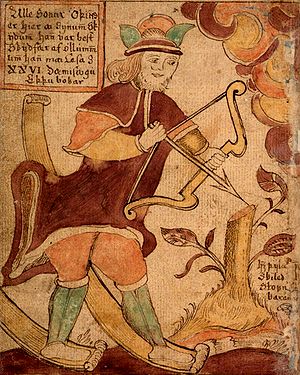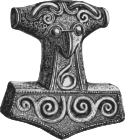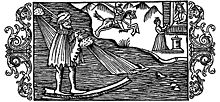- Ullr
-

In early Germanic paganism, *Wulþuz ("glory"; Old Norse Ullr) appears to have been a major god, or an epithet of an important god, in prehistoric times. The term wolþu- "glory", possibly in reference to the god, is attested on the 3rd century Thorsberg chape (as owlþu-), but medieval Icelandic sources have only sparse material on Old Norse Ullr.
The Old English cognate wuldor means "glory" but is not used as a proper name, although it figures frequently in kennings for the Christian God such as wuldres cyning "king of glory", wuldorfæder "glory-father" or wuldor alwealda "glorious all-ruler".
The medieval Norse word was Latinized as Ollerus. The Modern Icelandic form is Ullur. In the mainland Scandinavian languages the modern form is Ull.
Contents
Archaeological record
Thorsberg chape
The Thorsberg chape (a metal piece belonging to a scabbard found in the Thorsberg moor) bears an Elder Futhark inscription, one of the earliest known altogether, dating to roughly AD 200.
owlþuþewaz / niwajmariz
The first element owlþu, for wolþu-, means "glory", "glorious one", Old Norse Ullr, Old English wuldor. The second element, -þewaz, means "slave, servant". The whole compound is a personal name or title, "servant of the glorious one", "servant/priest of Ullr". Niwajmariz means "well-honored".
Lilla Ullevi
In Lilla Ullevi ("little shrine of Ullr"[1]) north of Stockholm archaeologists excavated during 2007 the site of a religious worshiping ground for Ullr (from 500 to 800 AD).[1] [2] The well-preserved state of the shrine may be unique in Scandinavia: it was shaped like a platform with two "arms" of rocks having four erected poles in front of it where there was probably a wooden platform.[1] Moreover, the archaeologists found 65 "amulet rings" in the area; rings are reported to have been used when people swore oaths.[1] They may be the rings of Ullr[2] that are referred to in the eddic poem Atlakviða.
Gesta Danorum
In Saxo Grammaticus' 12th century work Gesta Danorum, where gods appear euhemerized, Ollerus is described as a cunning wizard with magical means of transportation:
- Fama est, illum adeo praestigiarum usu calluisse, ut ad traicienda maria osse, quod diris carminibus obsignavisset, navigii loco uteretur nec eo segnius quam remigio praeiecta aquarum obstacula superaret. [1]
- The story goes that he was such a cunning wizard that he used a certain bone, which he had marked with awful spells, wherewith to cross the seas, instead of a vessel; and that by this bone he passed over the waters that barred his way as quickly as by rowing.– Elton's translation
When Odin was exiled, Ollerus was chosen to take his place. Ollerus ruled under the name Odin for ten years until the true Odin was called back, whereupon Ollerus retired to Sweden where he was slain by Danes.
Poetic Edda
 This illustration from an 18th century Icelandic manuscript shows Ullr on his skis and with his bow.
This illustration from an 18th century Icelandic manuscript shows Ullr on his skis and with his bow.
Ullr is mentioned in the poem Grímnismál where the homes of individual gods are recounted.
- Ýdalir heita
- þar er Ullr hefir
- sér of görva sali.
- Ydalir it is called,
- where Ullr has
- himself a dwelling made.– Thorpe's translation
The name Ýdalir, meaning "yew dales", is not otherwise attested. The yew was an important material in the making of bows, and the word ýr, "yew", is often used metonymically to refer to bows. It seems likely that the name Ýdalir is connected with the idea of Ullr as a bow-god.
Another strophe in Grímnismál also mentions Ullr.
- Ullar hylli
- hefr ok allra goða
- hverr er tekr fyrstr á funa,
- því at opnir heimar
- verða of ása sonum,
- þá er hefja af hvera.
- Ullr’s and all the gods’
- favour shall have,
- whoever first shall look to the fire;
- for open will the dwelling be,
- to the Æsir's sons,
- when the kettles are lifted off.– Thorpe's translation
The strophe is obscure but may refer to some sort of religious ceremony. It seems to indicate Ullr as an important god.
The last reference to Ullr in the Poetic Edda is found in Atlakviða:
- Svá gangi þér, Atli,
- sem þú við Gunnar áttir
- eiða oft of svarða
- ok ár of nefnda,
- at sól inni suðrhöllu
- ok at Sigtýs bergi,
- hölkvi hvílbeðjar
- ok at hringi Ullar.
- So be it with thee, Atli!
- as toward Gunnar thou hast held
- the oft-sworn oaths,
- formerly taken -
- by the southward verging sun,
- and by Sigtý’s hill,
- the secluded bed of rest,
- and by Ullr’s ring.– Thorpe's translation
Both Atlakviða and Grímnismál are often considered to be among the oldest extant Eddic poems. It may not be a coincidence that they are the only ones to refer to Ullr. Again we seem to find Ullr associated with some sort of ceremony, this time that of swearing an oath by a ring, a practice associated with Thor in later sources. During an excavation in 2007, of a Vendel era shrine for Ullr north of Stockholm, many symbolic rings were discovered and which are considered to represent Ullr's ring (see the archaeology section below).[2]
Prose Edda
In chapter 31 of Gylfaginning in the Prose Edda, written in the 13th century by Snorri Sturluson, Ullr is referred to as a son of Sif (with a father unrecorded in surviving sources) and as a stepson of Sif's husband; the major Germanic god Thor:
- Ullr heitir einn, sonr Sifjar, stjúpsonr Þórs. Hann er bogmaðr svá góðr ok skíðfœrr svá at engi má við hann keppask. Hann er ok fagr álitum ok hefir hermanns atgervi. Á hann er ok gott at heita í einvígi. [2]
- Ullr, Sif's son and Thór's stepson, is one [too]. He is such a good archer and ski-runner that no one can rival him. He is beautiful to look at as well and he has all the characteristics of a warrior. It is also good to call on him in duels.– Young's translation
In Skáldskaparmál, the second part of the Prose Edda, Snorri mentions Ullr again in a discussion of kennings. Snorri informs his readers that Ullr can be called ski-god, bow-god, hunting-god and shield-god. In turn a shield can be called Ullr's ship. Despite these tantalising tidbits Snorri relates no myths about Ullr. It seems likely that he didn't know any, the god having faded from memory.
Skaldic poetry
Snorri's note that a shield can be called Ullr's ship is borne out by surviving skaldic poetry with kennings such as askr Ullar, far Ullar and kjóll Ullar all meaning Ullr's ship and referring to shields. While the origin of this kenning is unknown it could be connected with the identity of Ullr as a ski-god. Early skis, or perhaps sleds, might have been reminiscent of shields. A late Icelandic composition, Laufás-Edda, offers the prosaic explanation that Ullr's ship was called Skjöldr, "Shield".
The name of Ullr is also common in warrior kennings, where it is used as other god names are.
- Ullr brands – Ullr of sword – warrior
- rand-Ullr – shield-Ullr – warrior
- Ullr almsíma – Ullr of bowstring – warrior [3]
Three skaldic poems, Þórsdrápa, Haustlöng and a fragment by Eysteinn Valdason, refer to Thor as Ullr's stepfather, confirming Snorri's information.
Etymology

The name Ullr is probably descended from the same word as Old English wuldor and the Gothic wulþus, meaning "glory". The reconstructed Proto-Germanic form is *Wulþuz.
Ullr's name appears in several important Norwegian and Swedish place names (but not in Denmark or in Iceland). This indicate that Ullr had at some point a religious importance in Scandinavia that is greater than what is immediately apparent from the scant surviving textual references.
Toponymy
- Ullarhváll ("Ullr's hill") - name of an old farm in Oslo.
- Ullarnes ("Ullr's headland") - name of an old farm in Rennesøy.
- Ullarvin ("Ullr's meadow") - name of four old farms in Hole Oslo, Ullensaker and Øvre Eiker.
- Ullarøy ("Ullr's island") - name of four old farms in Skjeberg, Spind, Sør-Odal and Vestre Moland.
- Ullinsakr ("Ullin's field") - name of two old farms in Hemsedal and Torpa (old church site).
- Ullinshof ("Ullin's temple") - name of three old farms in Nes, Hedmark (old church site), Nes, Akershus and Ullensaker (old church site).
- Ullinsvangr ("Ullr's field") - name of an old farm in Ullensvang (old church site).
- Ullinsvin ("Ullin's meadow") - name of an old farm in Vågå (old church site).
(For a possible nickname *Ringir for Ullr see under the name Ringsaker.)
- Ulleråker ("Ullr's field") Uppland
- Ultuna ("Ullr's town") Uppland
- Ullared ("Ull's clearing?") Halland
- Ullevi ("Ullr's sanctuary") Västergötland
- Ullvi ("Ullr's sanctuary") Västmanland
- Ullene ("Ullr's meadow") Västergötland
- Ullånger ("Ullr's bay") Ångermanland
Rydberg's theories
In Viktor Rydberg's idiosyncratic Teutonic Mythology Ullr is the son of Sif and Egill-Örvandill, half-brother of Svipdagr-Óðr, nephew of Völundr and a cousin of Skaði. His father, Egill, was the greatest archer in the mythology, and Ullr follows in his father's footsteps. Ullr helped Svipdagr-Eiríkr rescue Freyja from the giants. He also ruled over the Vanir when they held Ásgarðr during the war between the Vanir and the Æsir.
While most of Rydberg's theories are dismissed as fanciful by modern scholars his idea that Ullr is connected with the elves of Völundarkviða is not absurd. Both seem associated with skiing and hunting and since Ullr's father is not identified as one of the Æsir he may have been of another race.
See also
Notes
- ^ a b c d Ullberg, Sara (December 13, 2007). "Kultplats helgad åt guden Ull hittad i Upplands Bro". Dagens Nyheter. http://www.dn.se/DNet/jsp/polopoly.jsp?d=1058&a=724502. Retrieved 2008-02-29.
- ^ a b c A presentation on Swedish state television, channel 1.
References
- Eysteinn Björnsson (ed.) (2005). Snorra-Edda: Formáli & Gylfaginning : Textar fjögurra meginhandrita.
- Eysteinn Björnsson (2001). Lexicon of Kennings: Domain of Battle.
- Eysteinn Björnsson. Eysteinn Valdason: From a Thor poem.
- Finnur Jónsson (1931). Lexicon Poeticum, "Ullr". S. L. Møllers Bogtrykkeri, København. Entry available online at [4].
- Jón Helgason (Ed.). (1955). Eddadigte (3 vols.). Copenhagen: Munksgaard.
- Nesten, H. L. (ed.) (1949). Ullensaker - en bygdebok, v. II. Jessheim trykkeri.
- Rydberg, Viktor Undersökningar i Germanisk Mythologi, 2 volumes (1886–1889) Volume 1 (1886), translated as "Teutonic Mythology" (1889), Rasmus B. Anderson. London: Swan Sonnenschein & Co. Reprinted 2001, Elibron Classics. ISBN 1-4021-9391-2. Reprinted 2004, Kessinger Publishing Company. ISBN 0-7661-8891-4. Volume 2 (1889), translated as "Viktor Rydberg's Investigations into Germanic Mythology, Part 1: Germanic Mythology. William P. Reaves, iUniverse, 2004, and Part 2: Indo-European Mythology. William P. Reaves, iUniverse, 2008.
- Saxo Grammaticus, Gesta Danorum, Books I-IX, translated to English by Oliver Elton 1905.
- Saxo Grammaticus, Gesta Danorum, from the Royal Library in Copenhagen, Danish and Latin.
- Snorri Sturluson ; translated by Jean I. Young (1964). The Prose Edda : Tales from Norse mythology. Berkeley: University of California Press. ISBN 0-520-01231-3.
- Thorpe, Benjamin. (Trans.). (1866). Edda Sæmundar Hinns Froða: The Edda Of Sæmund The Learned. (2 vols.) London: Trübner & Co. 1866. (HTML version available at Northvegr: Lore: Poetic Edda - Thorpe Trans.)
Norse paganism Deities,
heroes,
and figuresOthersAsk and Embla · Dís (Norns · Valkyries) · Dwarf · Einherjar · Elves (Light elves · Dark elves) · Fenrir · Hel · Jörmungandr · Jötunn · Sigurd · Völundr · Vættir
Locations Asgard · Bifröst · Fólkvangr · Ginnungagap · Hel · Jötunheimr · Midgard · Múspellsheimr · Niflheim · Valhalla · Vígríðr · Wells (Mímisbrunnr · Hvergelmir · Urðarbrunnr) · YggdrasilEvents Sources Society See also Categories:- Hunting gods
- Æsir
Wikimedia Foundation. 2010.

